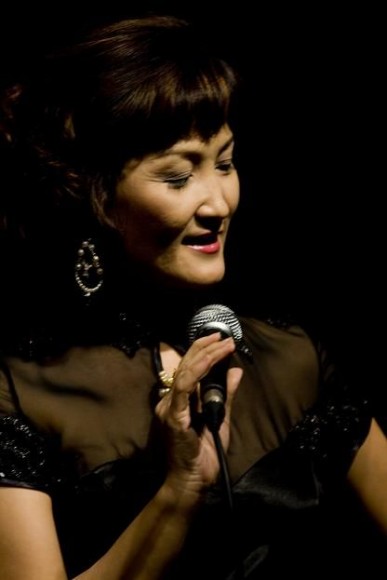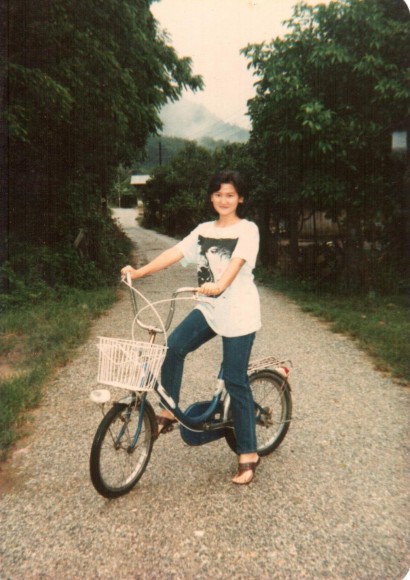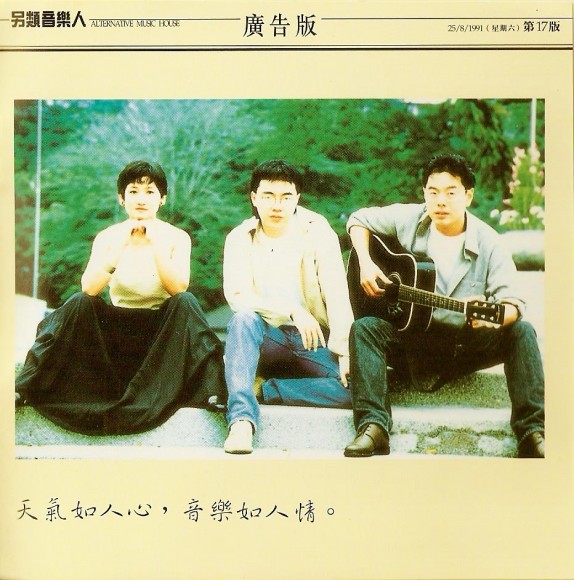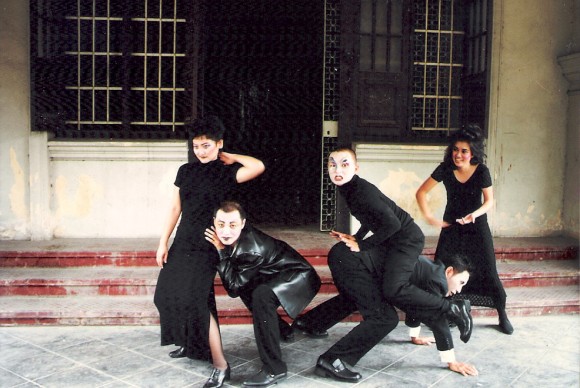
TO hear Yudi Yap sing is to be transported with nostalgia to another era.
The former vocalist of local Chinese-language band Alternative Music House started singing Chinese oldies in 1999. But even before then, she had already made her mark. Yap won the Best Voice Award when Alternative Music House represented Malaysia in the Sumitomo One World Pop Festival in Tokyo in 1992.
In December 2009, she revived Nanyang oldies like Dayung Sampan and Ban Seng Yim (Penang Beauties) in her concert titled Modern Nanyang.
Yap is also a songwriter, composing music and lyrics for other local singers. She has also helped local pop singer Ah Niu produce his music albums, and has performed in Five Arts Centre’s theatre productions.
In an exclusive interview with The Nut Graph on 9 June 2010 in Petaling Jaya, Yap shares her experience of growing up in a Chinese new village.
TNG: Where and when were you born?
Yudi Yap: I was born in a Chinese new village called Kampung Benggali, Ketari in Bentong, Pahang in the 60s. Although it was a Chinese new village, there were also a lot of Serani and some Malay [Malaysians] in the village.
Tell us more about your ancestry.
My parents are blue-collar workers and of Hakka lineage. My father was a driver, while my mother used to work as a rubber tapper. They are kind, thrifty, law-abiding citizens, the sort that people sometimes take advantage of due to their kindness. They would be anxious to return money they borrowed, but they themselves wouldn’t take it to heart if they were the lenders.
My paternal great-grandfather was from China. He bought land when he came to Malaya and became a shareholder of a bus company in Bentong. The family even had a car back then. This was before the world wars started. After that, my great-grandfather died and two to three years later, my grandfather died, too. My grandmother remarried and my great-grandmother had to sell the land to keep the family going.
My maternal grandfather was a gold miner in Raub. He passed away around his thirties, so my grandmother had to take care of her six children on her own. She only studied until Standard Three and couldn’t really speak Malay. My mother started working when she was young. She met my father when she went to Bentong to look for jobs.

Curiously, my maternal grandmother looked like a Westerner. A lot of my relatives from my mother’s side, including my younger brother, have Western features, too. But we couldn’t trace it back to [find out] which Western country our ancestors possibly [came] from.
How was growing up in Bentong like?
I’ve really fond memories of my childhood in Bentong; it was really carefree then. The kids could run all over the place, swim in rivers, climb hills, and steal fruits.
My family moved to Bahau in Negeri Sembilan because of my father’s work when I was nine, and I studied there until Standard Six.
We moved back to Bentong later, and I studied in a Catholic high school. That was when I joined the Catholic Youth Association and started singing and performing during Christmas celebrations in school. I was in a choir, then our teacher asked us to sing in smaller groups, and then in pairs, and finally I sang solo.
What songs did you sing back then?
Any song, especially campus folk songs from Taiwan. They were popular back in the 80s.
What happened after school?
While I was waiting for my Form Six results, I taught in a primary school in Jerantut. After that, I entered the Malaysian Institute of Art (MIA) to study fine arts. Our lecturers were really energetic and enthusiastic; most of them had just returned from studying overseas and had lots of fresh ideas to share with us. We were given a lot of freedom in campus. The lecturers opened up my mind and taught me to look at stuff from different perspectives.
I can still remember the story about a stone. If you put a stone on a beach, people will probably ignore it, thinking it’s an ordinary stone. But if you put it in a museum, shine spotlights on it, highlight its history and beauty, then people’s perception about it will probably change.
My course mates and I started a band called Colour Pallete when I was studying in MIA. We composed our own songs, went around performing in schools and colleges. Our lecturers knew of our “outside activities”, but allowed us to do whatever we wanted so long as we continued to [hand in] our assignments on time. I felt that was when my life truly began.
After graduating from MIA, Colour Palette evolved into Alternative Music House and we released albums. I have been in the music industry since.

When did you become aware of race? Is there any aspect of your identity that you struggle with?
I’ve had the chance to work with people from different races and ethnicities when I was involved in theatre. I also had good Malay and Serani Malaysian friends during my childhood. Even though I wasn’t fluent in Malay then and had to use sign language to communicate with my Malay friends, we had a lot of fun playing with each other.
My environment and music career may have been very “Chinese-ish”, but we work in the environment we’re familiar in, seemingly independent of each other yet connected in some ways. It’s natural. So I don’t think language and skin colour are problems at all. What matters is how we see and treat each other.
In my industry, I notice that the English- and Malay-language media rarely cover happenings in the local Chinese music industry, and vice versa. What kind of music is the most representative of Malaysia? I have been trying to look for it, but I think the spiritual element [in music] is the most important.

What hopes do you have for Malaysia?
I hope Malaysia will grow up wisely even though we are lagging, not merely economically but also in terms of freedom and being wholesome human beings. This land doesn’t belong to anyone. We make it meaningful. It takes everyone’s effort to work on it, and our ancestors have proven it in history.
I hope the politicians will return voice to the people, and [give us] the chance to think independently, to think for ourselves, instead of continuously confusing the people, particularly on racial and political issues.
Don’t erase or change history. The stories of Chinese Malaysians are part of the Malaysian narrative, too. I grew up here. I worked seriously to get to where I am today. The people I love are here. I have feelings for this land, too.
I hope there will be more focus on liberal arts in the education system so that our children can grow up with an open mind, and are able to think independently and critically, to appreciate nature, and be spiritually wealthy. And also be able to appreciate different cultures, [and be] a true global citizen. ![]()
The Nut Graph needs your support


Rhan says
“seemingly independent of each other yet connected in some ways.”
“but I think the spiritual element [in music] is the most important.”
“Don’t erase or change history. The stories of Chinese Malaysians are part of the Malaysian narrative, too. I grew up here. I worked seriously to get to where I am today. The people I love are here. I have feelings for this land, too.”
Yeah, this is supposed to be the way. You said it all, thanks Yudi.
Edi Mat Diah says
The song ‘dayung sampan’ on the YouTube [clip] almost made me weep with shame for being so petty and selfish about all these racial issues. The song was actually heavy with fresh hopes and excitement of pioneering spirit.
When you said “This land doesn’t belong to anyone”, I am sure you did not meant to be arrogant, but alas, that was exactly the first fleeting impression that I caught.
I therefore plead with you, please, please accept that the land belongs to the Malay. This country, after all was used to be known as Tanah Melayu, before we agreed to change it to Malaysia, out of respect to other races.
The fact that many people from all over the world came here to stay, should not erode that dominance. Naturally, it should be respected as a courtesy to the host. Even, should there come a day when the host is finally left with the last one person, you should wait until her death, before you start painting the country red or blue. Out of respect.
Think calmly about that. Many generations of Chinese were present in London too. But do you hear they claimed that London is no man’s land?
Sean says
“but do you hear they claimed that London is no man’s land?”
Of course!
Note that “born of thee” is sufficient to include the singer in “we”. I believe it would be “Land of Misery and Shame” if the lyrics were “who are white like me“. Nobody (except for a few inadequate people) cares where a Briton’s ancestors came from. If they were born in the UK and have a British birth Certificate, they’re as British as the Queen and Chicken Tikka Massala.
matdene says
I think before you look up high towards the UK, you’d better wiki the British National Party and the English Defence League. Those ang moh’s are doing the same thing like Perkasa, claiming that the whites should come first before the ‘pakis’ and the ‘chinks’.
Yee says
True. Some population of the British society are equally white supremacists. Luckily, they do not dominate the mainstream politics.
Yee says
“When you said “This land doesn’t belong to anyone”, I am sure you did not meant to be arrogant, but alas, that was exactly the first fleeting impression that I caught.”
She was not being arrogant. She was just telling the truth. Malaysia belongs to all Malaysian citizens. All Malaysians regardless of race and religion are here as of our right and not because of someone else’s gratefulness. All citizens do work for the betterment of our country, so please, I plead you to stop your ethnocentric beliefs.
lucia says
This land belongs to the aborigines (Orang Asli). Malays are also pendatang.
polynesian says
Exactly my sentiment, lucia. Sadly people like Edi are in denial when you say that.
I personally find it funny that when the Chinese and Indians first came to this land, why did the Orang Melayu not complain so much? You know, when the so-called pendatang were busy helping to build this country. Why only now do the second and third generations of Orang Melayu complain about pendatang?
So Edi, masa pendatang dulu datang tolong, datuk nenek hang duk diam je kan? Sebab dorang duk diam? Kenapa dorang tak buat bising cam ko? So we all pendatang lepas buat kerja suruh balik negara sendiri? Bak kata org Melayu, kacang melupakan kulit kan?
matdene says
When she said this land belongs to no one, how could she as a person born and bred here have some form of connection with this country, or to call this place home?
@ Edi Mat Diah. To think the non-Malay Malaysians as ‘pendatang’ and the Malays as hosts when most of them are born and bred here is ignorant, in my opinion. The land belongs not only to Malay Malaysians, but non-Malay Malaysians who’s born and bred on this soil as well. To think that way is almost to deny a Muslim convert as a Muslim.
Rhan says
“This land doesn’t belong to anyone”
I would rather construe it as the same meaning as the land belong to everyone that born here, but of course, to each his own.
“This country, after all was used to be known as Tanah Melayu, before we agreed to change it to Malaysia, out of respect to other races.”
Interesting, can we have any link to have a better understanding? But before doing that, please make sure your historical facts not limited to the twentieth century alone.
“Think calmly about that. Many generations of Chinese were present in London too. But do you hear they claimed that London is no man’s land?”
Ya lo, why huh? I think our “host” here should have a better answer. Oh btw, who is the host at London?
John Tang says
Dear Ms Yap
I knew of another Hakka family, by the surname of Pang with striking European features from Kuala Lipis. How is that which is your question too? I was told that the said family from Lipis had an ancestor who fought in the First World War in France and married a French lady. Brought her all the way back to China and raised a family there before moving on to Malaya a generation later.
Recently, there was an exhibition of what little remains of former Chinese conscripts/volunteers/soldiers(?) who had served in France during the First World War. Their presence was finally acknowledged and they left behind ‘poems’ engraved on spent mortar shell lamenting of HOME, much in the tradition of old… (see one of the recent issues of Economist).
Yes, we are all brothers in this four oceans.
Peace to you.
John
Yee says
“seemingly independent of each other yet connected in some ways.”
“but I think the spiritual element [in music] is the most important.”
“Don’t erase or change history. The stories of Chinese Malaysians are part of the Malaysian narrative, too. I grew up here. I worked seriously to get to where I am today. The people I love are here. I have feelings for this land, too.”
Yeah, this is supposed to be the way. You said it all, thanks Yudi.”
I second that. We have a wonderful multi-cultural society and every race does contribute to a better Malaysia.
Jeremy Tew says
This land, without a doubt, belongs to no one unless you live eternally. When the Supreme Being claims your breath one of these days, you are evidently proven not belonging to no land in the end. By whatever types or categories, these are all convenient narratives. Most significantly, enjoy life while you are still able to breathe an extra moment although life is so full of ironic differences and similar charms.
ng hui lin says
I feel warm reading this article, and feel fortunate to have been born in this multiracial country. [I like how we live in] hamony [with one another]. I love Malaysia!
Bobby says
Madness.
The story above is supposed to be about a good nice carefree childhood spent in a Chinese New Village and the comments descend into a racial issue.
The “land” belongs to whoever the title deed says it does, whether it’s Chinese or Malay or even Orang Asli.
End of the day, when the owner dies, they will answer to God on whatever sins of racial nature they did.
Dennis says
You sing so beautifully and when I hear you, there is a peace that comes over me. I would like to find out where I can get your albums. I am amazed that you are not married as you are a prize.